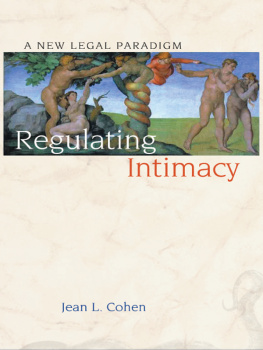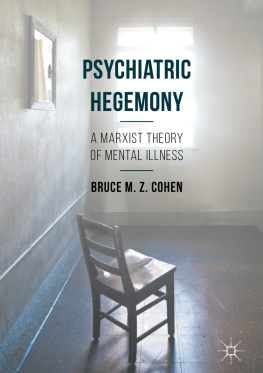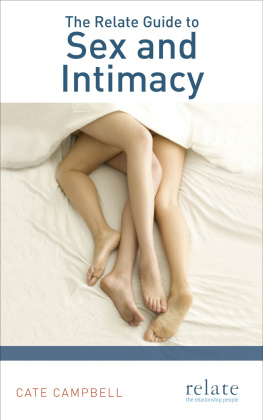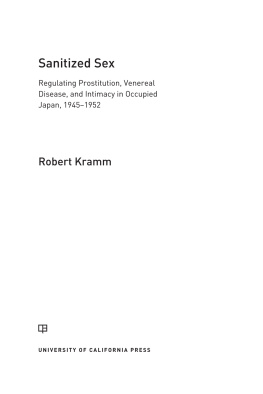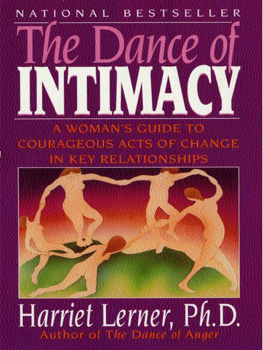REGULATING INTIMACY
Regulating Intimacy
A NEW LEGAL PARADIGM
Jean L. Cohen
PRINCETON UNIVERSITY PRESS
PRINCETON AND OXFORD
Copyright 2002 by Princeton University Press
Published by Princeton University Press, 41 William Street,
Princeton, New Jersey 08540
In the United Kingdom: Princeton University Press,
3 Market Place, Woodstock, Oxfordshire OX20 1SY
All Rights Reserved.
Library of Congress Cataloging-in-Publication Data
Cohen, Jean L., 1946
Regulating intimacy : a new legal paradigm
p.cm.
Includes bibliographical references and index.
eISBN: 978-1-40082-503-5
1. Sex and LawUnited States. 2. Privacy, Right ofUnited States.
KF9325 .C64 2002
342.73'0858dc212001027844
This book has been composed in Galliard
Printed on acid-free paper.
www.pup.princeton.edu
Printed in the United States of America
10 9 8 7 6 5 4 3 2 1
THIS BOOK IS DEDICATED TO
my son, Julian Arato, who has my love and respect.
Contents
This book has been long in the making. My initial interest in the regulation of intimacy was triggered by an invitation to participate in a conference organized by Professor Martha Fineman at the Columbia University School of Law in the fall of 1991 entitled Reproductive Rights in a PostRoe World. At the time, many feared that the Supreme Court was about to overturn Roe v. Wade in Planned Parenthood v. Casey (finally decided in 1992). My defense of the privacy justification for abortion rights was first developed in the paper prepared for that conference, which subsequently appeared in the Columbia Journal of Gender and Law (1992). At the 1993 CSPT conference, Democracy and Difference, co-sponsored by the Yale Program on Social Thought and Ethics, I presented another version of my privacy analysis in a paper entitled Democracy, Difference, and the Right of Privacy, which appeared in the volume Democracy and Difference, edited by Seyla Benhabib, in 1996. Chapter 1 of the present book is adapted from these articles, and incorporates the feedback I received at these and other conferences.
I would like to thank the Institute fr die Wissenschaften vom Menschen for funding the next stage in my research on gender, privacy, and the law in the spring of 1994. My stay in Vienna gave me the time to develop the main ideas of what became the second chapter of this book. A version of this chapter was first published in the Texas Journal of Genderand Law in 1996. A different version was developed for a paper presented to the 1995 CSPT conference, Private Virtues and Public Life, co-sponsored by the Yale Program in Ethics, Politics, and Economics, organized by Alan Ryan. There I explored the relation between law and the construction of gendered identity as well as the neocommunitarian approach to the regulation of minority sexual orientations. A version of this paper appeared in the volume Public and Private, edited by Maurizio Passerin dEntreves and Ursula Vogel, in 2000. Chapter 2 synthesizes the ideas presented and discussed in these conferences.
The main thesis of Chapter 3 on sexual harassment was first presented to the feminist reading group at Columbia Universitys Institute for Research on Women and Gender in 1998. The feedback from this session was very helpful, and I would especially like to thank Dorothea von Mucke of the German department and Carole Sanger of the law school. They both read several versions of this chapter and offered very good advice. I would also like to thank Gertrud Koch and the Kulturwissenschaftliches Institut in Essen, Germany, for inviting me to be a fellow in 1998. There I had the leisure to further develop and then present the rough draft of what became Chapter 3. Matthias Kettner and Maeve Cooke gave especially helpful comments. Pierre Rosanvallon, of the Ecoles des hautes Etudes en Sciences Sociales, deserves very special thanks for inviting me to lecture on this topic at the Centre Saint Simon in Paris in May 1999. A first-rate discussion occurred at the Centre, for which I am very grateful. Irene Thery and Monique Cantos Sperber deserve special thanks. I am also indebted to Denis Lacorne of Sciences Politiques at the University of Paris for inviting me to the international conference also held in Paris in December 1999 on privacy and intimate life. Beate Roessler deserves thanks for inviting me to present my work on privacy and sexual harassment at the Amsterdam conference she organized, Private and Public, in May 2000. Her comments and the discussions with Anita Allen and, again, Maeve Cooke were very helpful. Finally, Jeff Weintraub deserves thanks for having invited me to present my work on sexual harassment at an NEHseminar at Dartmouth in August 2000. Each of these conferences afforded the opportunity to further develop my ideas and generated important discussion. Chapter 3 is adapted from my essays on sexual harassment prepared for these conferences. The essays appeared in slightly different versions: Constellations 4, no. 4 (December 1999) and subsequently in La Revue Tocqueville 21, no. 2 (2000) and in the superb issue edited by Irene Thery of Esprit on lun et lautre sex (mars-avril 2001).
I cannot omit thanking my co-organizers of the yearly seminar on philosophy and the social sciences, for they have heard and discussed versions of these initial three chapters. They include Hubertus Buchstein, Peter Dews, Alessandro Ferrara, Axel Honneth, and Frank Michelman. Frank Michelman deserves special thanks for his extraordinarily helpful suggestions on my first two chapters. Participants in these seminars, too numerous to mention here, provided extremely insightful and helpful commentary. In particular, I would like to thank Jodi Dean for her helpful criticisms.
The most insightful comments on Chapter 4 came from William E. Scheuerman and Gunther Teubner. Both these colleagues were extraordinarily generous with their time and gave me very helpful suggestions on the reflexive law discussion, albeit from opposite points of view.
I would like to thank Ute Gerhard and Cristel Eckart for inviting me to the conference Public and Private, sponsored by the Graduiertenkol-lege at the Johann Wolfgang GoetheUniversitt, Frankfurt-am-Main, in the spring of 2001. There I had the chance to present a version of the final chapter of this text and received very thoughtful and helpful comments.
In addition to those already mentioned, I would like to thank the following friends and colleagues for their help and support: Alan Ryan, SeylaBenhabib, Martha Fineman, Rainer Forst, Morris Kaplan, Kendall Thomas, Bob Shapiro (in his capacity as chair of the political science de-partment), and, last in the sense of most recent, Susan Sturm.
Special thanks go to my editor, Ian Malcolm, for his great patience and help with seeing this book through. Allison Dawe has my gratitude for very helpful suggestions regarding Chapter 1. Eric Schramm did an excellent copy editing job, for which I am grateful. I would also like to thank my research assistant, Mona Krook, for her invaluable assistance on the footnotes and for her overall helpfulness and generosity. I thank James Turner as well, for his diligence in the preparation of the bibliography.
Last but most important of all, I want to thank Andrew Arato for his intellectual support, his willingness to discuss all aspects of this manuscript, and his encouragement of my project. Without his support this book would not have been written.
REGULATING INTIMACY
There have been remarkable changes in the domain of intimacy over the past four decades. For the first time in history, women are coming to be recognized as full legal persons and as equal citizensa change in status of epochal importance. They are also beginning to insist publicly upon their own agency and happiness in the domain of intimacy and elsewhere. Profound shifts in the cultural meaning of sexuality and gender inform and follow from these developments. So does contestation over the forms and ethics of intimate relationships and over the gendered division of labor.
Next page
